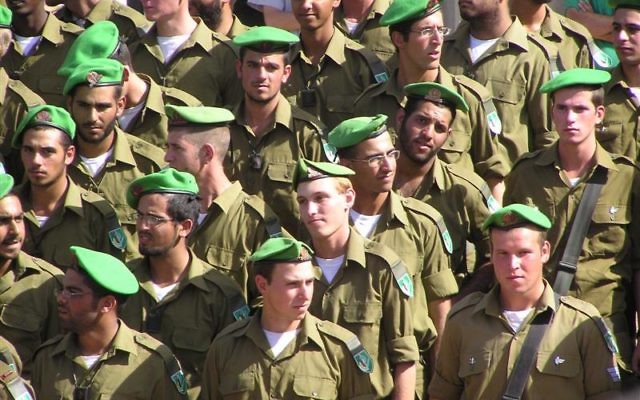OPINION: Israel’s army: unity, controversy and change
The modern Israeli state faces mounting political and ethical challenges regarding national defence and the enlistment of those who serve, writes a former president of the Board of Deputies.
In Israel the army is more than just a force, protecting the population from external attack, it is a socialising organisation bringing together people from diverse communities, from all classes and from countries all over the world and forging an Israeli identity.
Service in the army is a transformative experience; relationships formed there endure for the remainder of people’s lives. It is no surprise that a large number of Israel’s leading politicians have previously been senior officers in the army.
In return, the army tries to look after everyone even including people from communities who do not themselves claim to be Jewish such as the Druze and the Samaritans. If they are born in Israel they do national service. The army tries to find space even for people with special needs as Norwood a charity dealing with children with special needs have found to their surprise.
There is, however, one group of able bodied young men who do not serve, and frequently receive government subsidy, for not doing so. These are the yeshiva students. When the state was founded in 1948 Charedim were reeling from the devastation inflicted upon them in the Holocaust, which had destroyed all the main seats of Torah learning in Europe.

It seemed then that they could be on the verge of extinction. It was agreed therefore that those people for whom the Torah was their occupation (torato umnato) should be exempt from army service. At the time the number involved was around 450.
As we know from Malthus’s insights, population growth can produce remarkable results. The combination of third world birth rates with first world hygiene and medical care has resulted in a transformation of the community’s numbers. When I was living in Israel in 1968 the number had climbed to over 4,000.Last year more than 50,000 young men were claiming exemption. The issue has become a political hot potato.
Secular and national religious people who serve in the army see no reason why the Haredim should not join them while the ultra orthodox parties on whom Netanyahu’s political survival depends will not countenance any change in the system.
The war with Hamas has exacerbated matters. Those who do serve, are doing so for longer. They, and often even their fathers are having to do more reserve duty. Apart from the extra danger incurred, they are suffering damage to their careers. A problem has arisen which threatens the survival of the government.
While I was at the Board of Deputies I was approached by a haredi colleague to support what might be a solution. Nachal Caredi would involve yeshiva students joining the army not as individuals but as part of a group forming a battalion of ultra orthodox soldiers whose religious sensitivities would be respected with regard to sabbath and kashrut but also with regard to segregation of the sexes. The soldiers themselves would bring their religious values into the army.
The project has at first glance been successful. Initially around 300 were conscripted. By now their numbers amount to close to nine thousand. But the values they have imbibed as yeshiva students have proved problematic. Many of them belong to the hill top youth who have been establishing settlements which are illegal under Israeli law.
There have been more than half a dozen cases where their actions have led to prosecutions for offences involving torture including electrocutions and even sexual assaults on prisoners. The Army have now transferred them away from the West Bank and contact with Palestinians. Merav Michaeli previous leader of the labour party asked that the battalion be disbanded because of the ‘killing of too many innocent Palestinians’.
The final straw came recently with the arrest of a seventy eight year old Palestinian, Omar Assad. He was not suspected of terrorism but refused to hand over his papers, or cooperate with soldiers, when stopped for questioning. He was beaten up and left lying face down on a cold road. None of the soldiers called for medical help. By the time help arrived Assad had expired not directly because of the beating but according to the subsequent investigation indirectly because of an untreated heart attack caused by it. The picture of a group of religious students not merely failing to call for medical help but standing by, while an elderly man they had beaten up, died for lack of it, is more concerning than the death itself.
It was not the manner of Assad’s death, however, which has caused the political problem. It transpired that he was a US national which has led to considerable anger at the State Department. Because of Leahy’s law which prohibits the US government from supporting governments who breach human rights it was decided to sanction the battalion meaning that they will not receive US aid or training.
Israeli politicians have reacted strongly and it is possible that the sanction will be withdrawn. Netanyahu referred to a new moral low. When I read this, I thought he was referring to the conduct of the battalion itself.
In fact in the Alice in Wonderland world of Israeli politics it was a reference to the actions of the state Department. It is not the crime, but the criticism of it, which is the issue. More generally though, we should be thinking about the nature of the institutions from where these soldiers graduated and whose purpose is moral and religious training.
I was brought up to revere such institutions. to regard their leaders as moral and intellectual giants and their graduates as paragons of virtue. Yet these whose graduates behave in a manner calculated to provoke international contempt.
We need to rethink our values.

Thank you for helping to make Jewish News the leading source of news and opinion for the UK Jewish community. Today we're asking for your invaluable help to continue putting our community first in everything we do.
For as little as £5 a month you can help sustain the vital work we do in celebrating and standing up for Jewish life in Britain.
Jewish News holds our community together and keeps us connected. Like a synagogue, it’s where people turn to feel part of something bigger. It also proudly shows the rest of Britain the vibrancy and rich culture of modern Jewish life.
You can make a quick and easy one-off or monthly contribution of £5, £10, £20 or any other sum you’re comfortable with.
100% of your donation will help us continue celebrating our community, in all its dynamic diversity...
Engaging
Being a community platform means so much more than producing a newspaper and website. One of our proudest roles is media partnering with our invaluable charities to amplify the outstanding work they do to help us all.
Celebrating
There’s no shortage of oys in the world but Jewish News takes every opportunity to celebrate the joys too, through projects like Night of Heroes, 40 Under 40 and other compelling countdowns that make the community kvell with pride.
Pioneering
In the first collaboration between media outlets from different faiths, Jewish News worked with British Muslim TV and Church Times to produce a list of young activists leading the way on interfaith understanding.
Campaigning
Royal Mail issued a stamp honouring Holocaust hero Sir Nicholas Winton after a Jewish News campaign attracted more than 100,000 backers. Jewish Newsalso produces special editions of the paper highlighting pressing issues including mental health and Holocaust remembrance.
Easy access
In an age when news is readily accessible, Jewish News provides high-quality content free online and offline, removing any financial barriers to connecting people.
Voice of our community to wider society
The Jewish News team regularly appears on TV, radio and on the pages of the national press to comment on stories about the Jewish community. Easy access to the paper on the streets of London also means Jewish News provides an invaluable window into the community for the country at large.
We hope you agree all this is worth preserving.






















